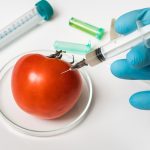A risky food “solution” to a problem that doesn’t exist
 (NaturalHealth365) A controversial new study in the UK is recruiting participants to eat soup made from gene-edited tomatoes – ostensibly to address vitamin D deficiency. The ViTaL-D Study at the Quadram Institute will test whether biofortified tomatoes, genetically modified to contain a vitamin D precursor, can raise vitamin D levels in people’s blood over 21 days.
(NaturalHealth365) A controversial new study in the UK is recruiting participants to eat soup made from gene-edited tomatoes – ostensibly to address vitamin D deficiency. The ViTaL-D Study at the Quadram Institute will test whether biofortified tomatoes, genetically modified to contain a vitamin D precursor, can raise vitamin D levels in people’s blood over 21 days.
But here’s what they’re not telling you: This 21-day study is not a food safety study, and it won’t monitor the health of participants consuming these gene-edited tomatoes over the medium or longer term. Instead, it’s an efficacy study designed with marketing in mind, not with precaution about human health.
The absurdity of engineering our food supply
Let’s be clear about what this actually involves. These tomatoes don’t even contain vitamin D3 – the desirable “sunshine vitamin.” They contain a precursor that must be converted to D3 by exposing the tomatoes to ultraviolet B light.
And here’s where it gets truly ridiculous: With whole tomatoes, vitamin D3 would only form on surfaces directly exposed to UVB light, so researchers had to slice the tomatoes thinly – just 1 millimeter – before UV treatment.
This means these tomatoes would have to be marketed in processed form, such as juice or soup, rather than as whole fruits. So much for fresh, natural food.
The safety questions no one is answering
Critics warn that this trial is a marketing ploy to test efficacy, not a safety study to monitor the long-term effects of genetically modified foods on human health.
The concerns about gene editing extend far beyond this single tomato experiment. Research has raised serious red flags about the safety of genetically modified foods. Studies on GM crops have documented potential issues, including unexpected changes in nutritional composition, the production of novel proteins that may trigger allergic reactions, and alterations in how these foods interact with human metabolism.
One particularly concerning aspect of gene editing technology is the potential for “off-target effects” – unintended genetic changes that occur alongside the desired modifications. These unpredicted alterations could produce compounds never before present in our food supply, with unknown long-term health consequences.
The UV treatment problem
There are additional concerns about the UV treatment process itself. Research has found that incorrectly applied UV treatment can change food composition, with free radicals and photochemical reactions potentially digesting proteins, damaging antioxidants, and oxidizing lipids.
Some vitamins are particularly sensitive to UV irradiation, with losses potentially reaching 50 percent. Photosensitive water-soluble vitamins include vitamin C, B12, B6, B2, and folic acid, while fat-soluble vitamins A, K, and E are also sensitive to light.
So while trying to add one vitamin, manufacturers might be destroying others. Does this make sense?
Natural solutions already exist
Here’s the truth that makes this entire experiment unnecessary: Non-GM vegan sources of vitamin D3 already exist – made from algae, lichen, or pine trees. Most vitamin D3 supplements are made from lanolin extracted from sheep’s wool. These are safe, tested, affordable options that don’t require genetic manipulation of our food supply.
Instead of gambling with gene-edited foods, focus on these evidence-based strategies:
- Get sensible sun exposure when possible during appropriate seasons
- Take high-quality vitamin D3 plus K2 supplements from natural sources
- Consume vitamin D-rich whole foods like wild-caught fatty fish, organic egg yolks, and mushrooms exposed to sunlight
- Avoid processed, gene-edited foods that may carry unknown long-term health risks
A global problem, not just a UK issue
This isn’t just about one study in Norwich or UK food policy. Gene editing of our food supply is accelerating globally, often with inadequate safety testing and minimal transparency. The UK government is determined to exclude gene-edited foods from GMO labeling requirements, making it harder for consumers to make informed choices about what they eat.
The push to normalize gene-edited foods is happening worldwide, driven by corporate interests that stand to profit from patented seeds and processed food products, not by genuine concern for public health.
Strengthen your immune system naturally
Vitamin D plays a crucial role in immune system function, helping the body fight off infections and illnesses. But getting your daily vitamin D from gene-edited, ultraprocessed soup? That’s not a health solution – it’s a marketing scheme.
Want to discover proven, natural strategies for immune health that don’t involve genetic manipulation?
Jonathan Landsman’s Immune Defense Summit brings together 34 of the very best scientists, researchers, doctors, and nutritionists who share evidence-based approaches to building robust immunity without risky experimental foods. You’ll learn about natural vitamin D optimization; whole-food nutrition strategies; and how to protect your health in an increasingly toxic world.
The bottom line: We don’t need to genetically engineer tomatoes to solve vitamin D deficiency. We need to return to natural, time-tested solutions and maintain the integrity of our food supply. Given the ready availability and relatively inexpensive cost of non-GMO D3 supplements, including vegan ones, there seems to be no obvious reason to buy gene-edited tomatoes.
The real question is: Why are we rushing to normalize genetic manipulation of our food when safe, natural alternatives already exist?
Sources for this article include:



